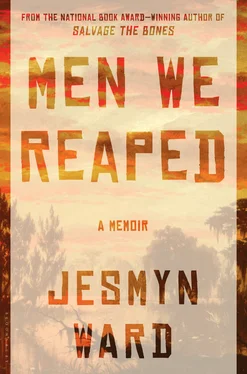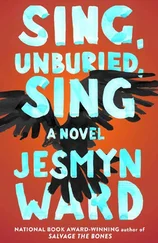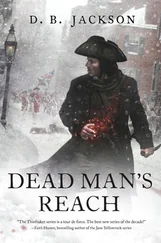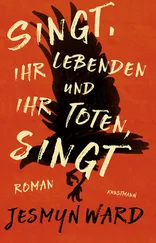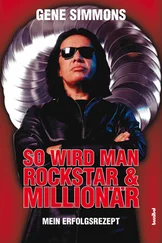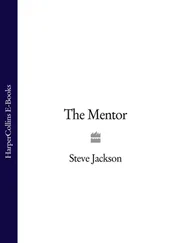But my father could be dark, too. He was attracted to violence, to the basic beauty of fighting, the way it turned his body and those he fought into meticulously constructed machines. He taught his purebred pit bull to fight with deflated bike tires. Alternately he coddled his dog, treated it as tenderly as one of his children, but the dog’s ability to fight was paramount, and my father had little mercy for him in his quest to make him harder to kill. Like my brother, my father’s dog required a hard hand if he would be his toughest.
My father stood in the doorway of the house with a machete in his hand, the blade so dark gray it looked black. He held it lightly, loosely. My mother was in her room watching television, and Joshua and I crowded around my father’s legs, looking out at the yard, at Homeboy, squat and as finely muscled as my father. Homeboy gleamed black and panted with his tongue out. He smiled at us.
“Stay inside,” my father said, and he trotted down the steps. Joshua and I dug into the door jamb, waited until Daddy walked around the house, leading Homeboy by his studded collar, to lean far out. We were determined to watch. One of my father’s first cousins, also shirtless in white shorts, grabbed Homeboy’s tail, held it down still and tight over a pillar of cinder blocks. Homeboy waited patiently, quietly, glanced back over his shoulder, and then snapped at a gnat. He trusted my father. Daddy whipped the machete up and brought it down hard on Homeboy’s tail, inches below where the tail merged into his backside. Blood spurted across the gray cinder in a steady gush. Homeboy yelped and jerked. My father dropped the machete and tied a bandage around Homeboy’s stump, and then smoothed his sides. Homeboy whimpered and quieted.
“Good boy,” my father said. Homeboy licked my father’s hand, butted him with his head.
Later, Joshua and I lay in our room, a room that was still decorated only for me; there were Cinderella curtains at the windows, and a rough Cinderella bedspread on my twin bed. When we moved in, Joshua had had his own room, but when my father decided he wanted a room for his weight bench and his kung-fu weapons, they moved Joshua into my room. This made me angry for a week or so because I felt territorial; this was my space. But that night Joshua and I lay quietly in our small beds, Joshua breathing softly, almost snoring, while I lay awake and listened to my father and his cousin in the other room, listened to them take smoking pipes down off the wall where my father had mounted them for decoration, listened to the clink of the weights, all this drifting down the hot hallway in the dark. The wind blew my curtains; they wafted out and stilled. The humid air coming into all the open windows of the house drew the smell of weed into my room. I knew this was some sort of smoke, like cigarettes. My father smoked it and my mother didn’t. Maybe my father and his cousin talked about their dogs. Maybe they talked about their cars. Maybe they whispered about women.
My mother had given birth to Nerissa by then. She’d also come to realize the hopelessness of her dreams that our growing family would bind my father to her and encourage his loyalty to her. She’d carried Nerissa to term, and my sister had been a hard birth. She’d been the heaviest of all of us, and had refused to descend down the birth canal, so the doctors and nurses had to drive her out of my mother by taking their forearms and sweeping down my mother’s stomach from rib cage to hip, and then grabbing Nerissa’s head with forceps. She didn’t want to leave me , my mother says. When Nerissa was born, she looked the most like my father: she had black hair and large, black eyes shaped like quotation marks in her face when she smiled.
The violence of my sister’s birth and the slow unraveling of our family marked my mother when she came home. She was more withdrawn. She turned inward. When her patience waned, she argued with my father over his infidelities, and while my father was dramatic and flamboyant with his anger, flipping mattresses from beds, my mother was curt. I imagine she wanted to spare us the spectacle of their arguments, the way violence hovered at the edges of their confrontations. They never touched each other in anger, but the small things in that house suffered.
That year, the world outside our house taught me and my brother different lessons about violence. Our play taught us that violence could be sudden, unpredictable, and severe, soon.
My mother’s brother took Joshua for a ride on his moped. Uncle Thomas was around nineteen, and his moped was white with a maroon seat. My brother sat on my uncle’s lap, and my uncle whooped and hollered as they rode in circles around the yard. My uncle had the kind of face that was so hard when he was serious that I could hardly believe it was the same face when he smiled. I wanted a turn on the moped. Joshua leaned forward and grabbed the handlebars, and pretended to steer. The moped accelerated. My uncle clicked the clutch so he could slow down while my brother pressed the gas, and they surged forward. My uncle cut the wheel to stop and they crashed in the sandy ditch. Joshua screamed. Blood ran steadily from his mouth. My uncle apologized again and again: I’m sorry I’m sorry I’m sorry , he said. My mother held Josh’s mouth wide to look inside and saw that the thin film of flesh that held his tongue to the floor of his mouth had been ripped. They made him suck on ice to dull the pain, to bring the swelling down. His sobs subsided and he went to sleep. They did not take him to the hospital. Perhaps they thought it would heal on its own, or they were afraid of the bill, or they were distracted by their failing relationship. Regardless, the slice healed.
My own lesson in sudden violence involved pit bulls, of course. My father had just purchased a full-grown white pit bull from another man in DeLisle; the dog’s name was Chief. One of my father’s dogs, Mr. Cool, the gentle white half-breed pit bull who’d comforted me when I was younger, had recently gotten sick. My cousin Larry had taken him out into the backyard into the deep woods behind the house with a rifle in hand, a job my father didn’t have the heart to do himself. My father planned to fight the new dog, Chief, along with Homeboy, whom he’d had since he was a puppy. This new dog was twice Mr. Cool’s size and less interested in my father’s human brood. Homeboy could be tender like Mr. Cool. He would shield me with his body, while Chief looked at me, unmoved.
On an unexceptional hot and bright day, I met Farrah and her brother Marty in the middle of the gravel driveway. Homeboy was asleep under the house. A stray girl dog trotted around us. Chief wandered over to investigate her. He stood to her side very stiffly, smelled her rear, her tail, her belly. He found something to interest him. Both of them stood still before me, entranced with each other. The sun was high. I was hot and cross, and Chief stood in my way.
“Move,” I said.
Chief’s ear twitched.
“Move, Chief!”
Farrah laughed.
“Move!” I said, and I hit Chief on his broad white back.
He growled and leapt at me. I fell, screaming. He bit me, again and again, on my back, in the back of my head, on my ear; his stomach, white and furry, sinuous and strong, rolled from side to side over me. His growl drowned all sound. I kicked. I punched him with my fists, left and right, over and over again.
Suddenly he was off me, yelping, running away with his back curved. My great-aunt Pernella, who lived in the smallest house in the field, was beating Chief away with a yellow broom. She picked me up off the ground. I wailed.
“Go home,” she told Marty and Farrah.
She placed a palm tenderly where my neck met my back, and she walked me down the long drive to our house. My head and back and arms were burning, red, hotter than the day. Walking was a scream. My mother stood in the doorway of our house. I was barefoot: blood plain on my face and streaming down my body to my feet. The back of my shirt was torn and turning black. Years later, my mother told me, “I saw him attacking you in front of Pernella’s house, saw her beating him off. I couldn’t move.” She was paralyzed by fear.
Читать дальше
